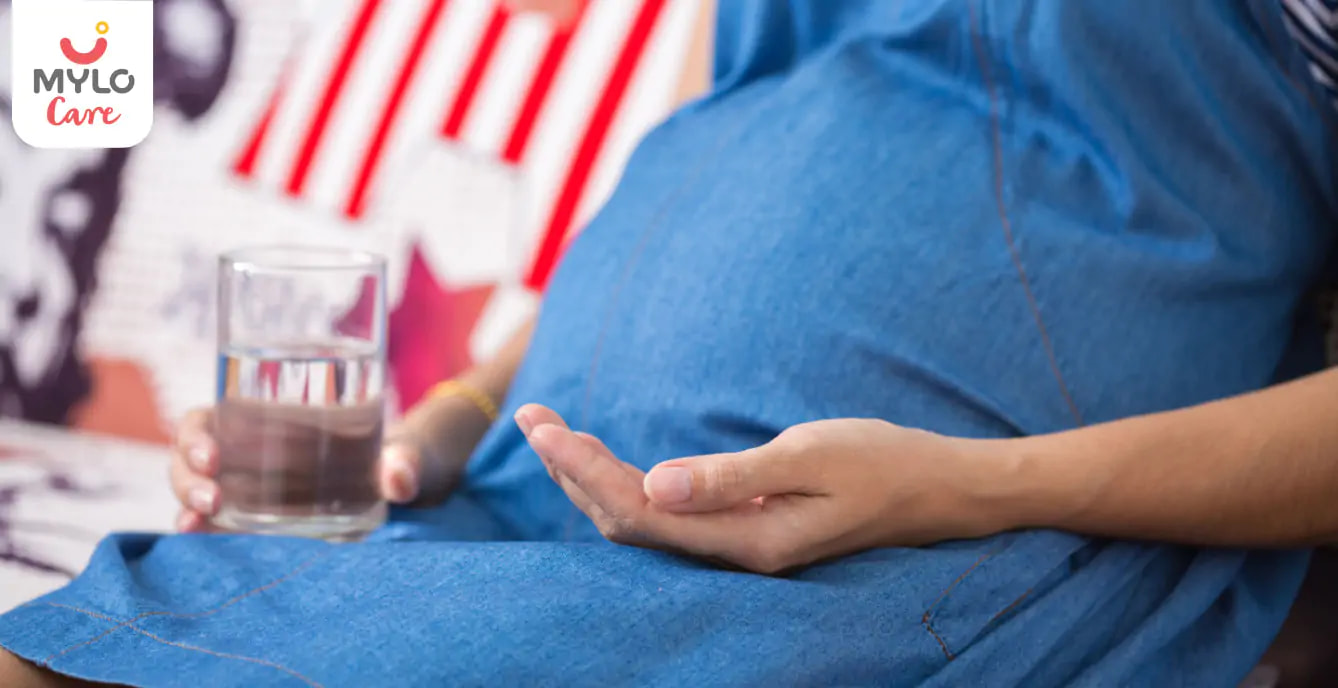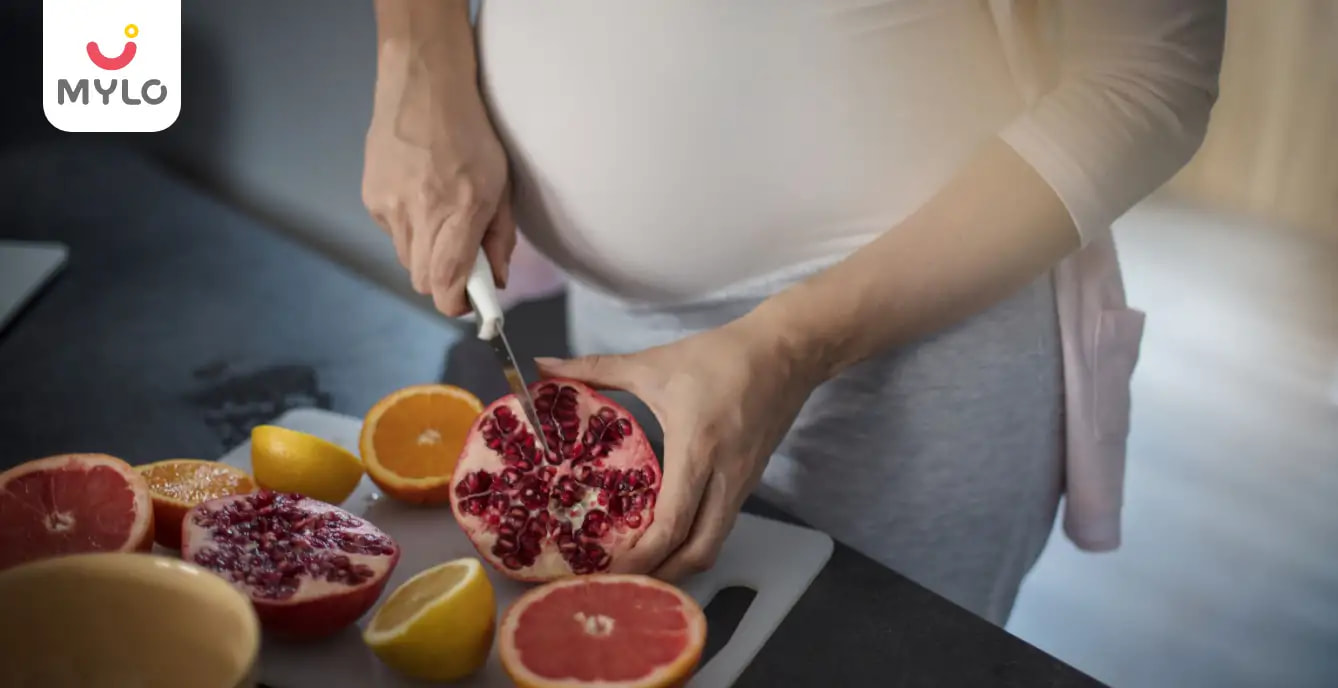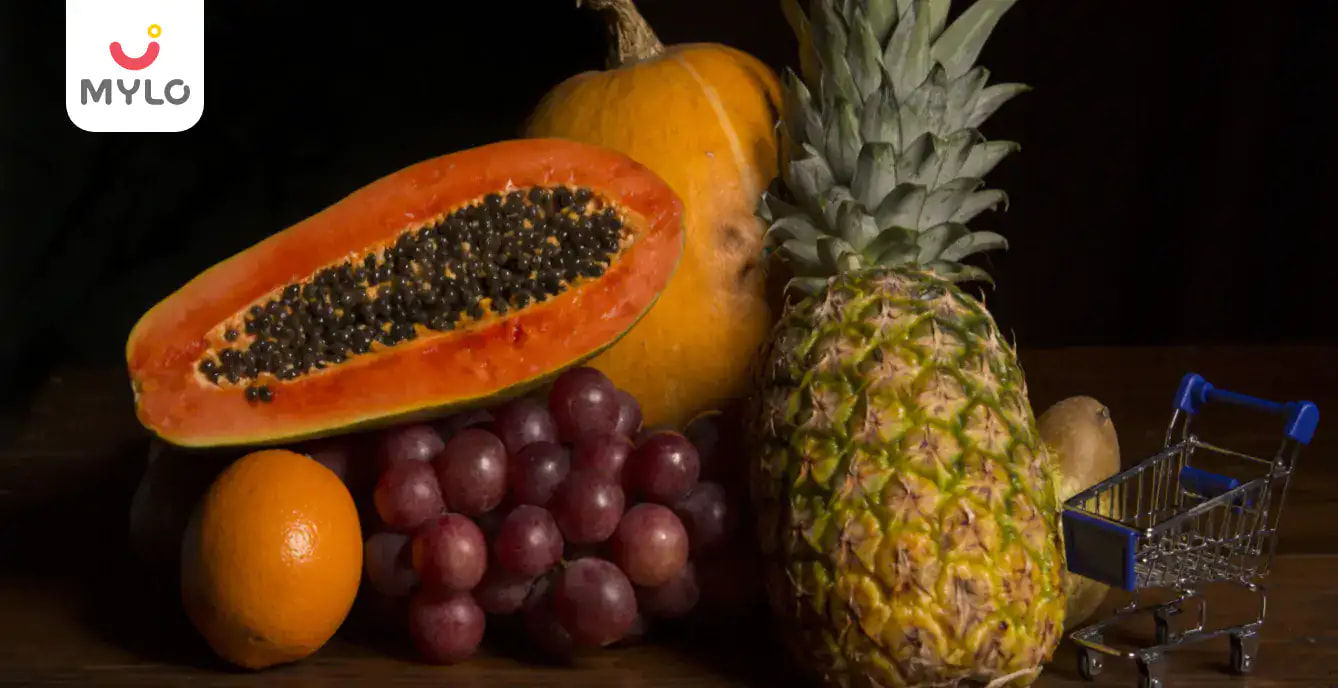Home

Vitamins & Supplements

When should a pregnant woman take folic acid?
In this Article
Vitamins & Supplements
When should a pregnant woman take folic acid?
Updated on 3 November 2023
Folic acid is a vital nutrient during pregnancy. It helps prevent specific congenital disabilities, and it contributes to the healthy growth of the placenta and baby. Folic acid also helps to prevent a kind of anaemia. Most women require about 600 mcg of folic during pregnancy, and you'll need to take a supplement to ensure that the requirement is reached. It is a good idea to take a folic acid supplement if you're of childbearing age, even before you're pregnant.
What Is Folic Acid?
Folic acid is a form of vitamin B9, which occurs naturally as folate in foods such as dark green leafy vegetables, oranges, whole grains, pulses, yeast and beef extract. This vitamin helps prevent specific congenital disabilities. It is essential for the production, repair and functioning of DNA, our genetic map and the fundamental building block of cells. It is necessary for the placenta's and developing baby's rapid cell growth. The body also requires folic acid to make normal blood cells and prevent a type of anaemia called folate deficiency anaemia.
What Is The Difference Between Folic Acid And Folate?
People often use the two interchangeably, as they are both forms of vitamin B9, but there is a significant difference between them. Folic acid is a synthesized version commonly used in processed foods and supplements. However, folate can be found in whole foods such as green leafy vegetables, eggs, and citrus fruits. Unfortunately, many women have a defect in their MTHFR gene that doesn't allow them to convert synthetic folic acid into active methyl folate properly. As such, women consuming folic acid may not be absorbing their B vitamins as anticipated. Hence, for this reason, it's preferable to take folate from whole food sources or supplements containing the natural form of active folate instead of synthesized folic acid whenever possible.
Why Should You Take Folic Acid When Pregnant?
Folic acid helps to protect the unborn baby from developing neural tube defects such as spina bifida in the first 12 weeks of pregnancy. Folic acid may also help prevent other congenital disabilities, such as Spina bifida and cleft palate.
Folate improves the production of red blood cells in your body, which is crucial during pregnancy when anaemia is a common complaint. Folic acid ensures that your body's red blood cell count is as expected, even when you take other supplements that could replenish the iron.
Folic acid also lowers the risk of premature birth, miscarriage, poor baby growth in the womb, and low birth weight issues.
Also, sufficient intake of folic acid daily is known to prevent preeclampsia, heart stroke, heart disease, cancer, and Alzheimer's disease.
Folic acid is needed to produce, repair, and function DNA. It is also essential for the rapid growth of the placenta and the developing baby.
The first 12 weeks of pregnancy is when the baby's brain and nervous system form and grow fast. Hence, taking folic acid supplements every day during the first three months of the pregnancy is essential, ideally, when trying for a baby. Once you enter 13 weeks of pregnancy, you can stop taking the supplement if you like to, though resuming then won't harm you or the baby.
When Should I Start Taking Folic Acid?
Congenital disabilities occur within the first three to four weeks of pregnancy. So it is essential to have folate in the system during those early stages when your baby's brain and spinal cord are developing. If you spoke to your doctor when you were trying to conceive, they possibly told you to begin taking a prenatal vitamin with folic acid. Some studies revealed that women who took folic acid for at least a year before getting pregnant reduced their chances of delivering early by 50% or more.
The CDC recommends taking folic acid every day for at least a month before you become pregnant and every day while you are expecting. Also, neural tube defects happen during the early stages of pregnancy, affecting about 3000 pregnancies a year. But women who take the recommended dose of folic acid daily and during the first trimester of pregnancy can reduce their baby's risk of neural tube defects by up to 70%.
How Much Folic Acid Should I Take?
You require about 600 mcg of folic acid during pregnancy, and it can be challenging to get all the folic acid you need from food alone, so you'll want to take a supplement. In addition to consuming food rich in folate, experts recommend that all women of childbearing age take a supplement containing 400 mcg of folic acid daily. Beginning your supplement at least a month before trying to conceive and continuing throughout your pregnancy is ideal. But since almost half of the pregnancies are unplanned, it is a good idea for all women who might become pregnant to take folic acid. Some experts recommend increasing your daily supplementation to 600 mcg once you become pregnant and throughout the pregnancy. It also suggests taking 500 mcg of folic acid daily for as long as you're breastfeeding.
Every woman is different, so ask your doctor how much folic acid suits you. Also, check the label of your prenatal vitamin to see how much folic acid it comprises. If it isn't enough, you can change brands or take a separate folic acid supplement. However, don't take more than one prenatal vitamin or multivitamin daily.
If you are taking prescription prenatal vitamins, they possibly comprise 800 to 1000 mcg of folic acid. However, don't take more than 1000 mcg of folic acid unless your doctor advises since this is the upper limit set by the Centre for Disease and Prevention.
Do I Need Extra Folic Acid?
Some women must take more than the recommended amount of folic acid. Speak with your doctor about your folic acid requirements if any of the following apply to you:
-
You've formerly been pregnant with a baby with a neural tube defect, and you or your partner has an NTD, or your partner has a child with NTD. In any of these cases, you'll probably be advised to take 4000 mcg of folic acid daily for at least three months before pregnancy and the first three months of pregnancy. Also, speak with your doctor about how much to take after that. You may be able to reduce it to 400 mcg starting in four months.
-
You are pregnant with twins. Your doctor may recommend you take as much as 1000 mcg of folic acid every day if you're carrying twins.
-
You have diabetes or are consuming specific anti-seizure medication, which increases your risk of having a baby with NTD. So it is better to talk to your doctor at least a month before trying to conceive to find out how much folic acid you should be taking and to oversee your condition in general.
-
You have celiac disease, inflammatory bowel disease, or a digestive infection which may make your body more challenging to absorb folate.
-
You have a specific genetic mutation. Some studies suggest that people with genetic variations known as methylenetetrahydrofolate reductase mutation may have a higher risk of giving birth to a baby with NTDs because this mutation may make it harder for the body to process folate and folic acid.
Does Folic Acid Cause Side Effects?
Most women don't have any side effects when consuming folic acid at doses of less than 1000 mcg daily. Taking a lot of folate in your diet doesn't happen to cause any problems. However, consuming high doses of folic acid over extended periods may cause symptoms such as abdominal pains, diarrhoea, nausea, gas, sleep issues, irritability, and confusion. In rare cases, folic acid may lead to an allergic reaction. Hence it is important to call your doctor immediately if you experience a skin rash, itchiness or redness.
Folic Acid Foods For Pregnancy
Food manufacturers must add folic acid to enriched grain products, such as breakfast cereals, bread, pasta, and rice. Also, some fortified breakfast cereals contain 100 percent of the recommended daily amount of folic acid, which is meant to be helpful for women who don't take a supplement and are hoping to get pregnant. In some countries, 1300 babies are born healthy yearly because of the folic acid fortification of foods. However, most women don't consume these foods consistently enough to depend on them as a source of folic acid.
Even if you consume a complete serving of a fully fortified cereal every day, you can't be sure you're getting what you require since synthetic nutrients added to cereals tend to end up in the milk at the bottom of the bowl. Foods generally rich in folate could be a better source. However, some research shows that the body absorbs folic acid from supplements much better than the naturally occurring folate in specific foods. Also, folate can be lost from foods during storage or destroyed while cooking.
So if you consume foods abundant in folate, consider them a compliment to your supplement. The best sources of folate include lentils, dried beans, peas and nuts, avocado, dark green leafy vegetables such as broccoli, spinach, collard or turnip greens, okra, Brussels sprouts, and asparagus. Also, other sources include citrus fruits and juices, tomatoes, bananas, eggs, squash, wheat germ, cornmeal, corn masa, peanuts and milk.
What Are The Signs Of A Folic Acid Deficiency?
The signs of folic acid deficiency can be slight. If you are only slightly deficient, you may not notice any symptoms or signs. Still, you won't get the optimal quantity of folic acid for your baby's early embryonic development. If you notice symptoms, they may include instability, anaemia, fatigue, sore tongue, diarrhoea, weight loss, weakness, headaches, heart palpitations, and shortness of breath. It is essential to contact your doctor if you notice any signs of folic acid deficiency or if you have any doubts about your folic acid requirements.
When Should You Stop Taking Folic acid?
You can stop consuming folic acid once you reach 12 weeks of pregnancy since the baby's spine will be well-developed until then. However, you can continue taking folate or folic acid supplements after the 12th week, as they will not harm you or your baby in any way.
Summary
There's no way to prevent all congenital disabilities with 100 percent certainty. However, taking adequate folic acid before and during pregnancy may help decrease the risk of neural tube defects, congenital heart defects, cleft palate, and cleft lip. Consider adding a prenatal vitamin to your daily diet if you are considering getting pregnant. Prenatal vitamins are accessible in capsules, tablets and chewable forms. Also, take prenatal vitamins with food to avoid stomach upset.
Always consult with your doctor regarding the correct dose of prenatal vitamins because taking too many supplements can be harmful to your baby. You can also add fortified foods with folic acid to your daily diet. Be sure to get serious about folic acid before you find out you're expecting to get serious about folic acid. Speak to your doctor to determine the amount of folic acid you require.



Written by
Ravish Goyal
Official account of Mylo Editor
Read MoreGet baby's diet chart, and growth tips

Related Articles
Related Questions
Is it essential to take tablets of folic acid?

Related Topics
RECENTLY PUBLISHED ARTICLES
our most recent articles

Diet & Nutrition
গর্ভাবস্থায় আলুবোখরা: উপকারিতা ও ঝুঁকি | Prunes During Pregnancy: Benefits & Risks in Bengali

Diet & Nutrition
গর্ভাবস্থায় হিং | ঝুঁকি, সুবিধা এবং অন্যান্য চিকিৎসা | Hing During Pregnancy | Risks, Benefits & Other Treatments in Bengali

Women Specific Issues
স্তনের উপর সাদা দাগ: লক্ষণ, কারণ এবং চিকিৎসা | White Spots on Nipple: Causes, Symptoms, and Treatments in Bengali

Diet & Nutrition
গর্ভাবস্থায় পোহা: উপকারিতা, ধরণ এবং রেসিপি | Poha During Pregnancy: Benefits, Types & Recipes in Bengali

Diet & Nutrition
গর্ভাবস্থায় মাছ: উপকারিতা এবং ঝুঁকি | Fish In Pregnancy: Benefits and Risks in Bengali

Diet & Nutrition
গর্ভাবস্থায় রেড ওয়াইন: পার্শ্ব প্রতিক্রিয়া এবং নির্দেশিকা | Red Wine During Pregnancy: Side Effects & Guidelines in Bengali
- ইনার থাই চ্যাফিং: কারণ, উপসর্গ এবং চিকিৎসা | Inner Thigh Chafing: Causes, Symptoms & Treatment in Bengali
- গর্ভাবস্থায় ব্রাউন রাইস: উপকারিতা ও সতর্কতা | Brown Rice During Pregnancy: Benefits & Precautions in Bengali
- Velamentous Cord Insertion - Precautions, Results & Safety
- Unlock the Secret to Flawless Skin: 7 Must-Have Qualities in a Face Serum
- Unlock the Secret to Radiant Skin: How Vitamin C Serum Can Transform Your Complexion
- Gender No Bar: 10 Reasons Why Everyone Needs a Body Lotion
- Unlock the Secret to Radiant Skin How to Choose the Perfect Body Lotion for Your Skin Type
- Top 10 Reasons to Apply a Body Lotion After Every Bath
- Communication in Toddlers: Milestones & Activities
- How to Improve Vocabulary for Toddlers?
- A Comprehensive Guide to Understanding Placenta Accreta
- Vulvovaginitis in Toddlers Causes, Symptoms and Treatment
- A Comprehensive Guide to Understanding Cerebral Palsy in Children
- Bitter Taste in Mouth During Pregnancy: Understanding the Causes and Remedies


AWARDS AND RECOGNITION

Mylo wins Forbes D2C Disruptor award

Mylo wins The Economic Times Promising Brands 2022
AS SEEN IN

- Mylo Care: Effective and science-backed personal care and wellness solutions for a joyful you.
- Mylo Baby: Science-backed, gentle and effective personal care & hygiene range for your little one.
- Mylo Community: Trusted and empathetic community of 10mn+ parents and experts.
Product Categories
Baby Carrier | Baby Soap | Baby Wipes | Stretch Marks Cream | Baby Cream | Baby Shampoo | Baby Massage Oil | Baby Hair Oil | Stretch Marks Oil | Baby Body Wash | Baby Powder | Baby Lotion | Diaper Rash Cream | Newborn Diapers | Teether | Baby Kajal | Baby Diapers Pants | Cloth Diapers | Laundry Detergent | Lactation Granules |








